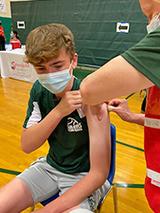

All U.S. residents (ages 6 months and older) are eligible for vaccination against SARS-CoV-2, the virus that causes COVID-19. Vaccination provides the best opportunity to protect your child from COVID-19.Like many parents, you may have questions about vaccine safety and wonder if vaccination is the right choice for your child. It’s important that all eligible individuals be vaccinated against COVID-19 and that you review your questions with a healthcare provider.
Why vaccinate your child
While most infected children usually experience minimal symptoms, some can develop severe illness. Vaccination is the best way to prevent your child from being hospitalized from COVID-19.
Answering your frequently asked questions
Experts at Children’s Hospital of Philadelphia (CHOP) address your common concerns to help you make the best decision for your family.
Is the COVID-19 vaccine safe for children and teenagers?

Yes. The currently approved COVID-19 vaccines have gone through clinical trials and scientific review just like any other vaccine — including those your child has likely already received — and no standards of quality or safety were sacrificed.
Does the COVID-19 vaccine have long-term side effects?
Short-term side effects of the COVID-19 vaccine are usually mild and can include fatigue, headache and muscle ache. To date, after hundreds of millions of doses, the currently available mRNA vaccines have had no cases of long-term side effects. Hear more from Dr. Paul Offit, Director of the Vaccine Education Center at CHOP.
You may have heard about a condition called myocarditis, which has sparked media attention as a very rare side effect of the COVID-19 vaccine. It is important to understand this rare side effect, particularly as it relates to your child, so that you can make an informed decision about vaccination. Here's what you should know about myocarditis and mRNA vaccines.
Can mRNA vaccines change an individual’s DNA?
No. mRNA is active in a cell’s cytoplasm and never enters the nucleus of the cell, which is where our DNA is kept.
Watch this video to learn more how mRNA vaccines work.
Can the COVID-19 vaccine cause infertility?
Infertility has not been found to be related to receipt of COVID-19 vaccine. Learn more.
My child has a pre-existing condition/health problem. Should they get the COVID-19 vaccine?
Some children with pre-existing conditions like diabetes, IBD or other autoimmune diseases, or those who are taking medications that compromise their immune system, might be at higher risk of complications from COVID-19 infection. The COVID-19 vaccines that have been approved for use cannot cause COVID-19, even in those with weak immune systems. Therefore, individuals with immune-compromising conditions should get the COVID-19 vaccine, as long as they do not have a severe allergy to a vaccine component (i.e., one that causes anaphylaxis or requires medical intervention).
We encourage you to talk to your child’s medical specialist to discuss individual risks and benefits and determine whether your child should receive the vaccine.
Additional resources
Featured in this article
Specialties & Programs

All U.S. residents (ages 6 months and older) are eligible for vaccination against SARS-CoV-2, the virus that causes COVID-19. Vaccination provides the best opportunity to protect your child from COVID-19.Like many parents, you may have questions about vaccine safety and wonder if vaccination is the right choice for your child. It’s important that all eligible individuals be vaccinated against COVID-19 and that you review your questions with a healthcare provider.
Why vaccinate your child
While most infected children usually experience minimal symptoms, some can develop severe illness. Vaccination is the best way to prevent your child from being hospitalized from COVID-19.
Answering your frequently asked questions
Experts at Children’s Hospital of Philadelphia (CHOP) address your common concerns to help you make the best decision for your family.
Is the COVID-19 vaccine safe for children and teenagers?

Yes. The currently approved COVID-19 vaccines have gone through clinical trials and scientific review just like any other vaccine — including those your child has likely already received — and no standards of quality or safety were sacrificed.
Does the COVID-19 vaccine have long-term side effects?
Short-term side effects of the COVID-19 vaccine are usually mild and can include fatigue, headache and muscle ache. To date, after hundreds of millions of doses, the currently available mRNA vaccines have had no cases of long-term side effects. Hear more from Dr. Paul Offit, Director of the Vaccine Education Center at CHOP.
You may have heard about a condition called myocarditis, which has sparked media attention as a very rare side effect of the COVID-19 vaccine. It is important to understand this rare side effect, particularly as it relates to your child, so that you can make an informed decision about vaccination. Here's what you should know about myocarditis and mRNA vaccines.
Can mRNA vaccines change an individual’s DNA?
No. mRNA is active in a cell’s cytoplasm and never enters the nucleus of the cell, which is where our DNA is kept.
Watch this video to learn more how mRNA vaccines work.
Can the COVID-19 vaccine cause infertility?
Infertility has not been found to be related to receipt of COVID-19 vaccine. Learn more.
My child has a pre-existing condition/health problem. Should they get the COVID-19 vaccine?
Some children with pre-existing conditions like diabetes, IBD or other autoimmune diseases, or those who are taking medications that compromise their immune system, might be at higher risk of complications from COVID-19 infection. The COVID-19 vaccines that have been approved for use cannot cause COVID-19, even in those with weak immune systems. Therefore, individuals with immune-compromising conditions should get the COVID-19 vaccine, as long as they do not have a severe allergy to a vaccine component (i.e., one that causes anaphylaxis or requires medical intervention).
We encourage you to talk to your child’s medical specialist to discuss individual risks and benefits and determine whether your child should receive the vaccine.
Additional resources
Recommended reading
COVID-19 in Children
Coronavirus disease 2019 (COVID-19) is a respiratory illness. It's caused by a coronavirus called SARS-CoV-2.
Contact us
Division of Infectious Diseases